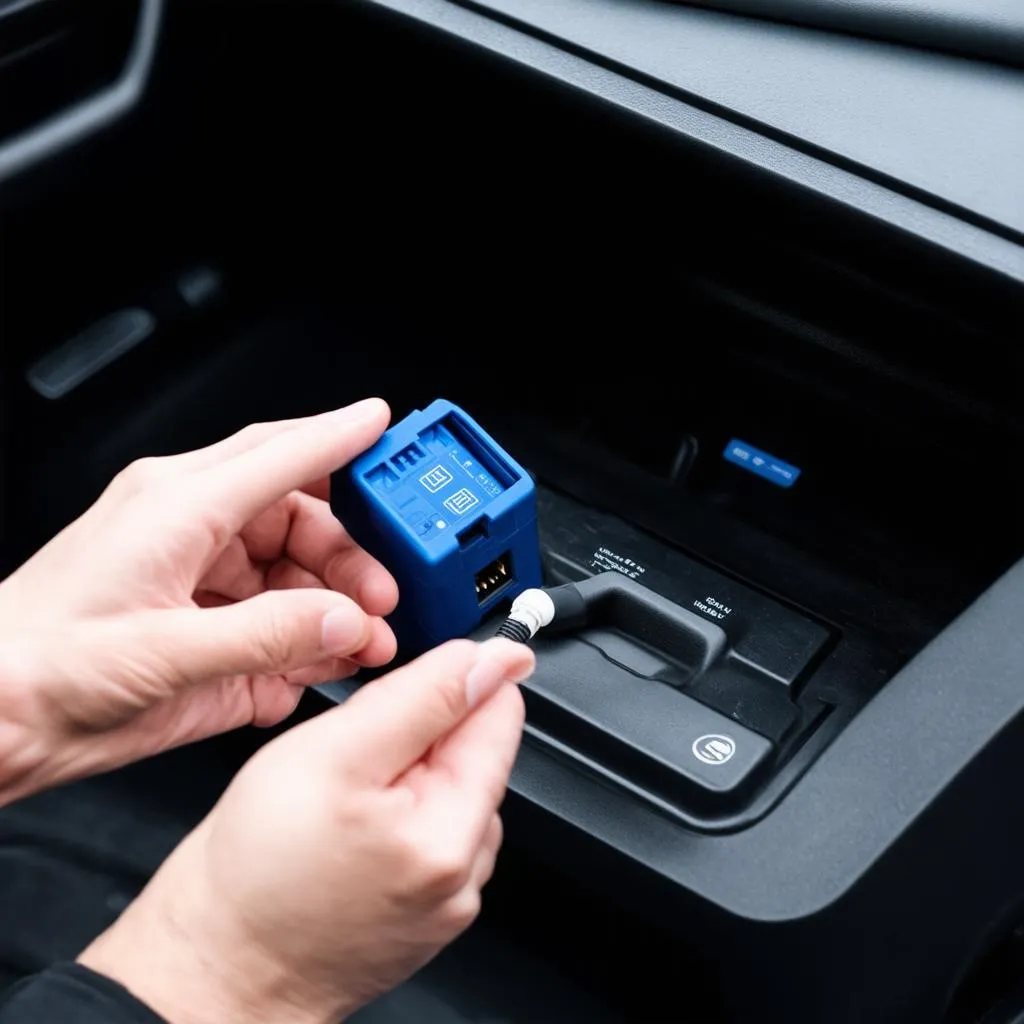Have you ever gunned the engine of your 2019 Elantra Sport, only to wish for a little more oomph? You’re not alone. Many car enthusiasts, especially those with a soft spot for Hyundai’s sporty sedan, dream of squeezing out every ounce of performance. That’s where the idea of an Elantra Sport 1.6 tune through the OBD port comes into play. But what does it all mean, and is it the right choice for you? Buckle up as we navigate the world of OBD tuning and explore if it’s the upgrade your Elantra Sport craves.
Demystifying the Jargon: OBD Tuning Explained
Before we dive into the specifics, let’s break down some terminology.
- OBD Port: Remember that little port under your dashboard, often near the steering wheel? That’s the OBD (On-Board Diagnostics) port. It’s a portal to your car’s computer, allowing mechanics and, yes, even you, to communicate with its electronic brain.
- ECU: This stands for Engine Control Unit. Think of it as the mastermind behind your engine’s performance. It dictates parameters like fuel injection, ignition timing, and boost pressure (for turbocharged engines).
- Stage 1 Tune: In the world of car tuning, this typically refers to a software modification that optimizes your ECU’s settings for enhanced performance while staying within safe and reliable operating limits.
Now, imagine using the OBD port like a USB port for your car’s brain. A Stage 1 tune is akin to installing new software – it tweaks the parameters controlled by the ECU to unlock hidden power, improve throttle response, and potentially even boost fuel efficiency.
Is OBD Tuning Right for Your Elantra Sport?
Imagine cruising down Sunset Boulevard in Los Angeles, California, the sun setting over the Pacific. You’re behind the wheel of your Elantra Sport, and with a simple plug-in and upload, you’ve unlocked a new level of performance. Sounds enticing, right?
Here’s a breakdown of the potential benefits and drawbacks to consider:
Pros:
- Power Boost: The most significant advantage is the noticeable increase in horsepower and torque, adding a new layer of excitement to your daily commute or spirited weekend drives.
- Improved Throttle Response: Say goodbye to that annoying lag between pressing the gas pedal and feeling the acceleration. OBD tuning can sharpen your Elantra Sport’s reflexes.
- Potential Fuel Efficiency Gains: While not always guaranteed, some users report slight improvements in fuel economy, especially with more responsive throttle mapping.
Cons:
- Warranty Concerns: This is a big one. Modifying your car’s ECU can potentially void your warranty, especially if not done by a certified Hyundai dealer.
- Reliability Risks: While generally considered safe, pushing your engine beyond its factory settings always carries a slight risk. It’s crucial to choose a reputable tuner and tuning software.
- Potential for Increased Emissions: Depending on the specific tune and your driving habits, OBD tuning could potentially increase emissions.
Expert Insight:
“It’s crucial to understand that while OBD tuning can be tempting, it’s not a ‘one size fits all’ solution,” says automotive engineer, Dr. Emily Carter, author of “The Performance Engine Handbook.” “Factors like your car’s age, mileage, and overall condition play a crucial role in determining if OBD tuning is the right choice.”
 Elantra Sport OBD Port
Elantra Sport OBD Port
Making an Informed Decision
The decision to OBD tune your Elantra Sport is a personal one. Consider your priorities, driving style, and risk tolerance.
Here are some questions to guide you:
- How important is warranty coverage to you?
- Are you comfortable with potential reliability risks?
- Do you prioritize performance gains above all else?
- Have you researched reputable tuners and tuning software specific to your Elantra Sport model?
Exploring Alternatives
If OBD tuning feels a little too adventurous, consider other avenues for enhancing your Elantra Sport’s performance:
- Cold Air Intake: Improves airflow to the engine, potentially increasing power.
- Cat-Back Exhaust System: Enhances exhaust flow, often boosting horsepower and providing a more aggressive exhaust note.
- Suspension Upgrades: Improve handling and responsiveness, making your Elantra Sport feel more planted on the road.
FAQs About Elantra Sport 1.6 OBD Tuning
Is it legal to OBD tune my car?
Laws surrounding car modifications vary by location. Research your local regulations to ensure compliance.
Can I revert my car to its factory settings after OBD tuning?
Yes, in most cases, you can flash your ECU back to its stock settings.
Will OBD tuning affect my car’s resale value?
It depends. Some buyers may be wary of modified cars, while others might see it as a plus.
Do I need to be a tech expert to perform OBD tuning?
While the process can be relatively straightforward, it’s essential to have a basic understanding of cars and software.
 Hyundai Elantra Sport Driving
Hyundai Elantra Sport Driving
Ready to Explore More?
Check out these related articles on our website:
- Finding the Right OBD Scanner for Your Hyundai: Not all OBD scanners are created equal. Discover the best options for your needs.
- Understanding Hyundai Engine Codes: Learn how to decipher those cryptic codes that pop up on your dashboard.
Need Expert Assistance?
We’re here to help! At Tech Car USA, our team of automotive specialists is available 24/7 to answer your questions and provide guidance. Contact us via WhatsApp at +84767531508 for personalized support.
Ultimately, the decision of whether or not to pursue an Elantra Sport 1.6 tune through the OBD port rests in your hands. Arm yourself with knowledge, weigh the pros and cons, and choose the path that aligns best with your driving desires.